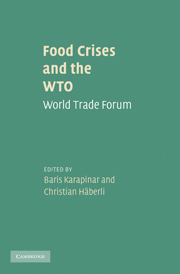Book contents
- Frontmatter
- Contents
- List of contributors
- List of figures
- List of tables
- List of abbreviations
- Preface
- 1 Introduction: food crises and the WTO
- PART 1 Economics of the food crisis
- 2 The food price crisis, poverty and agricultural trade policy
- 3 Globalisation of agriculture and food crises: then and now
- 4 Solving the food crisis in Africa: achieving an African Green Revolution
- 5 Rising food prices: causes, consequences and policy responses
- 6 Shift and swing factors and the special role of weather and climate
- PART 2 Trade and law: WTO and beyond
- 13 Conclusions and policy recommendations
- Index
- References
4 - Solving the food crisis in Africa: achieving an African Green Revolution
from PART 1 - Economics of the food crisis
Published online by Cambridge University Press: 12 May 2010
- Frontmatter
- Contents
- List of contributors
- List of figures
- List of tables
- List of abbreviations
- Preface
- 1 Introduction: food crises and the WTO
- PART 1 Economics of the food crisis
- 2 The food price crisis, poverty and agricultural trade policy
- 3 Globalisation of agriculture and food crises: then and now
- 4 Solving the food crisis in Africa: achieving an African Green Revolution
- 5 Rising food prices: causes, consequences and policy responses
- 6 Shift and swing factors and the special role of weather and climate
- PART 2 Trade and law: WTO and beyond
- 13 Conclusions and policy recommendations
- Index
- References
Summary
Introduction
The rising poverty and food insecurity in Africa is one of the major development challenges facing the world today. While democracy, good governance and accountability through mutual peer-reviewed political processes are gradually taking root, the dividends of democracy have yet to be felt by the majority of the population, especially the rural poor who depend on agriculture for their livelihood. While globally there is a food surplus and prices of food have declined, reducing poverty and hunger in many parts of Asia, Africa remains the only region where malnutrition and hunger spots persist. The Green Revolution that rapidly raised agricultural productivity in Asia and laid the foundation for the accelerated industrial and broader economic growth of the region has bypassed Africa. Meeting the Millennium Development Goals will still be a far stretch for Africa as it is projected that under the current business-as-usual scenario it will not be able to meet the goals for another 100 years.
This chapter discusses the food crisis faced by Africa and traces the root causes of the low and declining agricultural productivity in African agriculture. It considers the major challenges facing African agriculture, assesses the progress being made in agricultural research, and identifies some of the major reasons why a green revolution has not taken root on the continent, and how Africa can turn its agriculture around to the benefit of millions of poor smallholders. The chapter argues that there is a need for urgent measures to achieve a green revolution in Africa.
- Type
- Chapter
- Information
- Food Crises and the WTOWorld Trade Forum, pp. 81 - 108Publisher: Cambridge University PressPrint publication year: 2010



